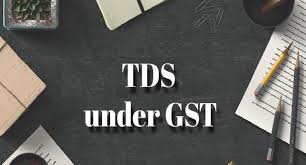The provisions regarding tax deduction at source (TDS) under GST law are mandated in Section 51 of the CGST / SGST Act(s). Further this Section also has applicability to IGST and UTGST Acts also. The provisions in regard to tax deduction at source are discussed in the succeeding paras.
EFFECTIVE DATE OF APPLICABILITY OF TDS PROVISIONS
As per Notification No. 50/2018 Central Tax dated 13-09-2018 the effective date of applicability of TDS provisions is 01-10-2018. Accordingly, tax will be required to be deducted by specified persons on payments made or credited to suppliers on or after 01-10-2018.
TDS PROVISIONS UNDER GST LAW – AT A GLANCE
The provisions in respect to deduction of tax source are contained in the Section 51 of the CGST Act, 2017. Similar provisions exist in SGST Acts of respective State Governments. Further such provisions are also applicable to IGST Act, 2017 in terms of Section 20(x) of IGST Act,2017 and to UTGST Act, 2017 as per Section 21(xi) of the UTGST Act, 2017. Further apart from Section 51 of the CGST / SGST Acts certain other provisions of such Acts will also be applicable in regard to TDS. In addition to above the machinery provisions in regard to compliance to TDS provisions are contained in CGST / SGST Rules, 2017.
For ready reference, the matrix of provisions of GST Law relevant in regard to deduction of tax at source is tabulated below:
| Sl. No | Description | Section of CGST Act /SGST Act | Rule of CGST Rules / SGST Rules | GST Forms |
| 1. | Transitional provisions | 142(13) | ||
| 2. | Persons liable to deduct, Conditions, time and rate of deduction. | Section 51(1) | ||
| 3. | Compulsory requirement for registration as Tax Deductor | Section 24 (vi) | ||
| 4. | Application for registration | Section 25 | Rule 12(1) | GST REG-07 |
| 5. | Grant of Registration Certificate | Rule 12(2) | GST REG-06 | |
| 6. | Cancellation of Registration Certificate | Rule 12(3) read with Rule 22 | GST REG-08 | |
| 7. | Payment of Tax deducted at source | Section 51(2) read with Section 39(7) | Rule 85(4) | GST PMT-05 |
| 8. | Payment of interest on delayed payment. | Section 51(6) read with Section 50(1) | ||
| 9. | Filing of TDS Return | Section 51(5) read with Section 39(3) | Rule 66(1) | GSTR-7 |
| 10. | Late fee for delay in filing of TDS Return | Section 47(1) | ||
| 11. | Issue of TDS Certificate | Section 51(3) | Rule 66(3) | GSTR-7A |
| 12. | Late fee for late furnishing of TDS certificate | Section 51(4) | ||
| 13. | Claim of credit of tax deducted by deductee | Section 51(5) | Rule 66(2) read with Rule 87(9) | |
| 14. | Penalty on TDS default | Section 122(1)(v) | ||
| 15. | Demand of TDS | Section 51(7) read with Section 73 or 74 | ||
| 16. | Refund of TDS | Section 51(8) read with Section 54 |
OVERVIEW OF TDS UNDER GST LAW
For benefit of readers, a brief overview on important provisions relating to TDS under GST Law is given below. For detailed discussion, relevant Chapter of this Book may be referred to.
Persons required to deduct tax
As per Section 51(1) of the CGST Act, 2017 read with Notification No. 50/2018 – Central Tax dated 13-09-2018 following persons (deductors) need to deduct tax at source.
- a department or establishment of the Central Government or State Government; or
- local authority; or
- Governmental agencies; or
- an authority or a board or any other body, –
(i) set up by an Act of Parliament or a State Legislature; or
(ii) established by any Government,
with 51% or more participation by way of equity or control, to carry out any function;
- Society established by the Central Government or the State Government or a Local Authority under the Societies Registration Act, 1860;
- public sector undertakings.
Quantum and rate of tax deduction
The tax would be deducted @1% (CGST and SGST each for intra-State supply) and @ 2% (IGST for inter-State supply) of the payment made to the supplier (the deductee) of taxable goods or services or both, where the total value of such supply, under a contract, exceeds Rs 2,50,000/- (excluding the amount of central tax, State tax, Union territory tax, integrated tax and cess indicated in the invoice).
No tax deduction required in some cases
No deduction shall be made if the location of the supplier and the place of supply is in a State or Union territory which is different from the State, or as the case may be, Union territory of registration of the recipient. Further tax is also not required to be deducted in case the preconditions of tax deduction as laid down under Section 51(1) are not fulfilled. Example: Payment of exempt supplies, taxable supplies where contract value does not exceed Rs 2.50 lakh etc.
Registration of TDS deductors
A TDS deductor has to compulsorily register without any threshold limit. The deductor has a privilege of obtaining registration under GST without having required to obtain PAN. He can obtain registration using his Tax Deduction Account Number (TAN) issued under the Income Tax Act, 1961.
Payment of TDS
The amount of tax deducted at source (TDS) under GST law should be deposited to the Government account by the deductor by 10th of the succeeding month. The deductor would be liable to pay interest if the tax deducted is not deposited within the prescribed time limit.
Filing of TDS Return
The deductor is also required to file a return in Form GSTR-7 within 10 days from the end of the month. The details of tax deducted at source furnished by the deductor in FORM GSTR-7 shall be made available to each of the suppliers in Part C of FORM GSTR-2A electronically through the Common Portal and the said supplier may include the same in FORM GSTR-2. The amounts deducted by the deductor get reflected in the GSTR-2 of the supplier (deductee). The supplier can take this amount as credit in his electronic cash register and use the same for payment of tax or any other liability.
TDS Certificate
A TDS certificate is required to be issued by deductor (the person who is deducting tax) in Form GSTR-7A to the deductee (the supplier from whose payment TDS is deducted), within 5 days of crediting the amount to the Government, failing which the deductor would be liable to pay a late fee of Rs. 100/- per day from the expiry of the 5th day till the certificate is issued. This late fee would not be more than Rs. 5000/-.
Avail of credit by supplier
The TDS deducted and deposited by deductor in the government account shall be reflected in the electronic cash ledger of the supplier (i.e. deductee) who would be able to use the same for payment of tax or any other amount.
Consequences of not complying with TDS provisions:
| Sl. No | Default made | Consequence of default |
| 1. | TDS not deducted | Interest to be paid along with the TDS amount; else the amount shall be determined and recovered as per the law. |
| 2. | TDS certificate not issued or delayed beyond the prescribed period of five days | Late fee of Rs. 100/- per day subject to a maximum of Rs. 5000/ |
| 3. | TDS deducted but not paid to the government or paid later than 10th of the succeeding month | Interest to be paid along with the TDS amount; else the amount shall be determined and recovered as per the law. |
| 4. | Late filing of TDS returns | Late fee of Rs. 100/- for every day during which such failure continues subject to a maximum amount of five thousand rupees. |
Further in case of TDS default under GST law, penalty of Rs 10,000/- or an amount equivalent to the tax not deducted under section 51 or short deducted or deducted but not paid to the Government, whichever is higher.
***
[rainbow]Don’t miss the next GST Update / Article / Judicial pronouncement[/rainbow]
Subscribe to our newsletter from FREE to stay updated on GST Law
Resolve your GST queries from national level experts on GST free of cost.
Frah Saeed is a law graduate specializing in the core field of indirect taxes and is the Co-founder of taxwallah.com. She has authored many publications on GST and is into full-time consultancy on GST to big corporates. She as a part of taxwallah.com heads a team comprising of Chartered Accountants and Advocates and plays a key role in our mission to disseminate GST knowledge to all.



